| Reviews & Columns |
|
Reviews DVD TV on DVD Blu-ray 4K UHD International DVDs In Theaters Reviews by Studio Video Games Features Collector Series DVDs Easter Egg Database Interviews DVD Talk Radio Feature Articles Columns Anime Talk DVD Savant Horror DVDs The M.O.D. Squad Art House HD Talk Silent DVD
|
DVD Talk Forum |
|
|
| Resources |
|
DVD Price Search Customer Service #'s RCE Info Links |
|
Columns
|
|
|
Paradise Kiss, Vol. 1
THE SHOW:
Note: The original version of this review posted on November 7, 2006, was based on an advance preview copy. Since then, DVD Talk received a final copy of the disc. This review has been amended (January 8, 2007) to reflect this, including a rating upgrade. The screencaps are still from the screener; they reflect the same picture quality, just at a full frame aspect ratio. Rest assured, the retail release is anamorphic widescreen.
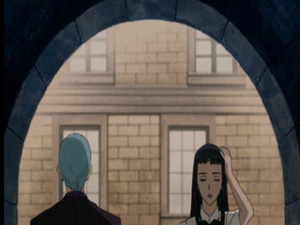
Ai Yazawa is quickly becoming one of my favorite manga artists. Her stories are romantic soap operas about misfits who find a common bond in their outsider status. Her love of fashion and music gives the stories a uniquely modern look, while also adapting classic iconography from both worlds so that books like Nana will feel hip twenty years from now. This is also helped by her writing's refreshing honesty about human foibles and feelings, including sexuality. Yazawa characters are people you would want to know--or better yet, want to be if you were cool enough.
Paradise Kiss was a comic book that ran for five volumes from 2000-2003. It only made the leap from printed page to TV screen last year, and now Geneon is bringing the anime to America (the manga has been available in English for several years). The focal character of Paradise Kiss is Yukari, a straight-laced student who is being pushed into an academic career she doesn't want by an overbearing mother. When she accidentally stumbles into a private club run by the Paradise Kiss fashion studio, a group of students attending a nearby college of design, she discovers a world of freedom and choice she has only dreamed of.
The Paradise Kiss kids immediately bring Yukari in, giving her a more fashionable haircut and inviting her to be their model. She isn't sure what to think of them. They intrigue her, but with intrigue comes fear and bafflement. After all, they don't even refer to her by name, they call her "Caroline," a fantasy moniker given to her by Miwako, the pink haired Lolita who is too sweet for her own good (so much so, her medicine is actually a "magical" candy; not drugs, but actual sugary candy). Her boyfriend is Arashi, an obnoxious punk musician with safety pins through his lip. He's the one who first finds Yukari and tries to recruit her to be the ParaKiss model. She's scared of him and would have run away if not for Isabella, a transgender, statuesque beauty who combines the style of a geisha with an American southern belle and just a dash of femme fatale.
And, of course, there is George, the conceited dandy and the lead designer at ParaKiss. He is the one who is going to really knock Yukari for a loop. He knows what he wants, and he goes after it.
Episode #1: "Studio": This is your basic first episode and lays out most of what I have detailed above. It's a good set-up for the characters and the central conflict. Yukari isn't sure she wants to join the Paradise Kiss studio as of yet. Also, when she leaves them, she drops her notebook, and the hidden photo in the back is the clue to her secret crush on her classmate, Hiroyuki.
#2: "Illumination": Yukari begins to see what being part of ParaKiss could mean for her social life and self-esteem when everyone at school notices her new haircut, including Hiroyuki. When George makes it his personal mission to get her to agree to be their model, it also starts to stir feelings in her. By the end, and after a glorious champagne-fueled party, she accepts the gig. A further wrinkle develops when she discovers Hiroyuki was in a childhood love triangle with Arashi and Miwako.
#3: "Kiss": There's no mistaking what is going to happen in this episode, not from that title. Yukari's head is swimming with the thought of all her boys, but her problem develops added clarity when she is taking Hiroyuki for a surprise rendezvous with Miwako. The two of them pass George on the street, and this brief encounter forces George's hand. Naturally, the more George expresses himself, the more he becomes frustratingly aloof, keeping Yukari on her toes.
#4: "George": Production of the dress Yukari will model for the school competition is heating up, and so is the relationship with George. His forwardness leads to a fight, and spending all the time with her new friends is starting to get Yukari in trouble at home.
The thing I liked best about the Paradise Kiss anime was its adaptation of the Ai Yazawa art style. More traditional Japanese animation is mixed in with real photo backgrounds, blown-out lighting, and painted sequences that resemble color pieces from the manga. Each episode opens with an abstract sequence of cutely absurd insects moving through the city, and the wipes between scenes are various images of flowers and bizarre toy creatures. The animators use a lot of extreme close-ups, focusing on particular character details like a pierced ear or showing a person from mouth to waistline so that the emphasis is on his or her outfit. This fetishization of personal style is perfect for the themes of fashion and individualization. For high comedy, Paradise Kiss uses the super-deformed technique. It's quite fun, and it's carried over into the closing title sequence, a goofy dance set to Franz Ferdinand's "Do You Want To." Paradise Kiss is an impeccably designed series.
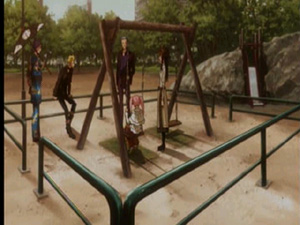
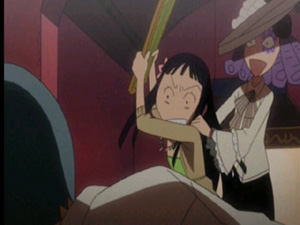
THE DVD
Video:
Paradise Kiss is given a succulent anamorphic widescreen transfer at 16:9. The colors are lovely to look at, catching the subtlety of design and the intricate backgrounds of the anime.
Sound:
I watched the full English dub on my first viewing, and the voices are generally good. I thought the actor playing George tried a little too hard to cultivate an arty (read: British) affectation, but everyone else was cast very well and the mouth synchronization was well-timed.
For my second time through, I watched the Japanese version with English subtitles. I preferred this option much better. Naturally, the original voice actors are going to fit the personalities of the animated figures much more, and the characters came off as far more natural. Still using George as an example, the Japanese version has a deeper, smoother voice, making him more mysterious and way cooler.
All audio options will be mixed in 2.0.
Also, there is a lot of great music in Paradise Kiss. In addition to the Franz Ferdinand song over the closing credits, Tommy February performs the opening song, "♥Lonely in Gorgeous♥." The shows themselves have many songs in the background, including numbers by J-rock band the Babys.
Extras:
The final disc for Paradise Kiss has a host of extras.
* Photo Shoot with Yu Yamada (6 minutes) - A behind-the-scenes look at a photo session with the Japanese voice actress for Yukari, who is also well known as a model and pop singer. In the photos, she dresses as Yukari. The clip also includes a brief interview with Yamada, footage from the recording for episode 1, and scenes from the anime.
* Press Conference (15 min.): From October 2005, held in Harajuku's Laforet Museum, and featuring producer Yoko Matsuzaki, director Osamu Kobayashi, art director/stylist Asami Kiyokawa, and the voice actor for Miwako, Marika Matsumoto, who looks very much like her character in style and dress (though, no pink hair). Costume designer Atsuro Tayama is also represented via a pre-taped message. After this brief talk, Yu Yamada appears in a gown that was designed by Tayama. It says something about the level of anime in Japan that the series is given such fanfare at its roll-out, and Ai Yazawa is treated with the sort of respect we don't even see for famous novelists who are having their work adapted in Hollywood. Koichi Iwaki, who plays George's father is then brought out, followed by a final thought from all participants.
* TV Commercials - Five in all, totaling nearly two minutes together. They are essentially the same, with the musical focus or the extras promoted changing in each one.
* Character Concept Art - Multiple character sheets are shown for George and Yukari, though I didn't really like how they were presented. Instead of putting the line art on a solid background, the images are shown as clear with a flower photo behind them.
* Previews for more Geneon DVDs - After a short Geneon intro, you get three previews for Saiyuki Reload Gunlock, Kyo Kara Maoh! Part 2, and Last Quarter, the live action film based on another Ai Yazawa manga (reviewed here).
The DVD comes in a clear plastic case and there is different artwork on both sides of the cover. You can switch it around and choose which version of it you most prefer.
A DVD-Rom extra gives a bonus peak at the Ai Yazawa manga, translated and published in the U.S. by Tokyopop and also highly recommended by this reviewer. The preview consists of a pdf of the first 15 pages of the debut volume and a color gif of the cover.
FINAL THOUGHTS:
Highly Recommended. Paradise Kiss is a mature soap opera with individualistic characters and a strong sense of style. The first volume teases out just enough of the various romantic entanglements to satisfy viewers while leaving them anxious for volume two. The characters have a lot of room to grow and change, and as their relationships develop, the fun will be in watching those transformations take shape.
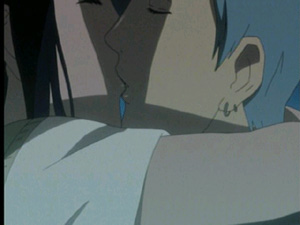
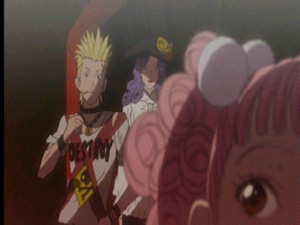
Jamie S. Rich is a novelist and comic book writer. He is best known for his collaborations with Joelle Jones, including the hardboiled crime comic book You Have Killed Me, the challenging romance 12 Reasons Why I Love Her, and the 2007 prose novel Have You Seen the Horizon Lately?, for which Jones did the cover. All three were published by Oni Press. His most recent projects include the futuristic romance A Boy and a Girl with Natalie Nourigat; Archer Coe and the Thousand Natural Shocks, a loopy crime tale drawn by Dan Christensen; and the horror miniseries Madame Frankenstein, a collaboration with Megan Levens. Follow Rich's blog at Confessions123.com.
|
| Popular Reviews |
| Sponsored Links |
|
|
| Sponsored Links |
|
|
| Release List | Reviews | Shop | Newsletter | Forum | DVD Giveaways | Blu-Ray | Advertise |
|
Copyright 2024 DVDTalk.com All Rights Reserved. Legal Info, Privacy Policy, Terms of Use,
Manage Preferences,
Your Privacy Choices | |||||||













